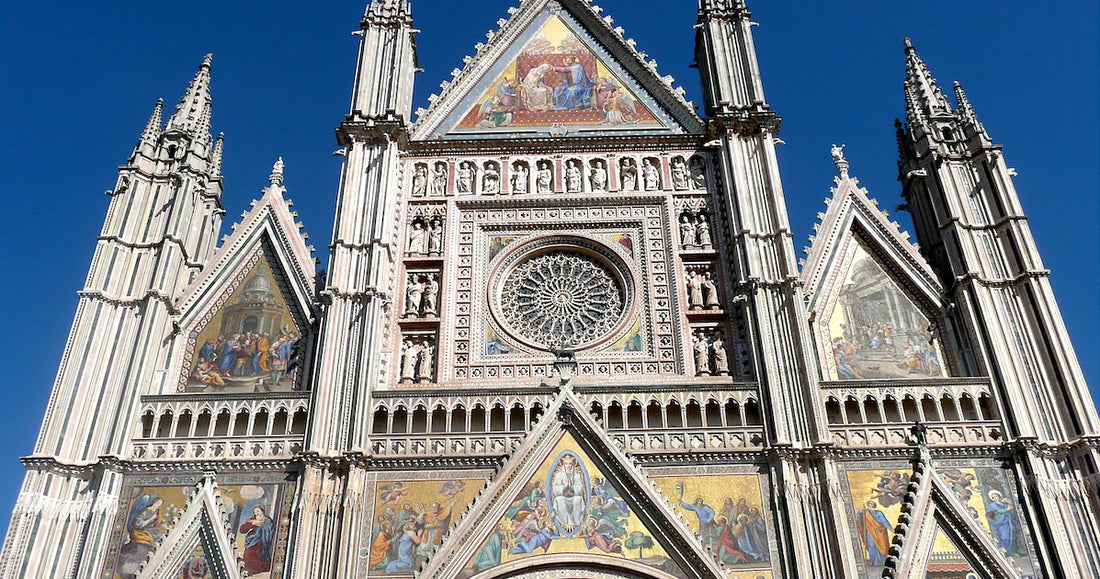
Corpus Christi: The Beauty of the Eucharist
Dr. Edward SriThis week’s episode is from a LIVE Facebook event that was done on Corpus Christi last week. Dr. Sri covers the beauty of the Eucharist, and answers questions from listeners.
For full shownotes, visit Ascensionpress.com/Allthingscatholic, or text ALLTHINGSCATHOLIC to 33-777 for weekly shownotes sent to your inbox.
“The greatest place to offer your life as a gift from God, to worship him, is in the Mass, because you’re united with Jesus who made the perfect gift of self.”
Traveling to Orvieto
Lying just north of Rome is the medieval town of Orvieto. In Orvieto, there is a massive cathedral. It’s beauty is breathtaking, but why is this cathedral there? Turns out there was a priest who was struggling in his faith, and as he celebrated mass one day, drops of blood fell from the Body of Christ. This blood is preserved inside the cathedral, and it’s known as one of the Eucharistic miracles. On the feast of Corpus Christi, the town has a huge festival honoring this miracle.
3 Key Aspects of the Eucharist
-
Real Presence
- Studies are sadly showing that less and less Catholics are believing that the bread and wine presented at Mass are the true Body and Blood of Christ.
- While the Eucharist may have the outward appearance of bread and wine, it is mysteriously and miraculously so much more.
- The Bible supports the real presence of Christ in the Eucharist, most notably in the passage below
“Jesus said to them, ‘Very truly I tell you, unless you eat the flesh of the Son of Man and drink his blood, you have no life in you. Whoever eats my flesh and drinks my blood has eternal life, and I will raise them up at the last day. For my flesh is real food and my blood is real drink. Whoever eats my flesh and drinks my blood remains in me, and I in them. Just as the living Father sent me and I live because of the Father, so the one who feeds on me will live because of me. This is the bread that came down from heaven. Your ancestors ate manna and died, but whoever feeds on this bread will live forever.’”
John 6:53-58
-
Communion Meal
- The Bible also always follows sacrifice with a communion meal, just as we eat the Lamb that is sacrificed in every Catholic Mass
- Jesus loves and delights in you even more than you long for his presence in the Eucharist
“For Christ, our paschal lamb, has been sacrificed. Let us, therefore, celebrate the festival, not with the old leaven, the leaven of malice and evil, but with the unleavened bread of sincerity and truth.”
1 Corinthians 5:7-8
-
The Eucharist as Sacrifice
- The sacrifice is made presence at every Mass, so when we go to Mass, we go to Calvary
- Not only do we aid in the sacrifice, but we unite ourselves to his Passion, which is a big responsibility
- In the Bible, Passover is not only celebrated as a remembrance, but a memorial. To have a memorial is to make an event present, the past is made present. So when the Jews celebrated the Passover, it was a spiritual and mystical event where you became one with Moses and Aaron, and all those who marched through Egypt.
- At every Mass, Christ’s sacrifice on Calvary is made present. The reason we are asked and expected to go is because we owe God everything because of that sacrifice. We owe him our praise.
- If you can’t go to Mass right now, make a daily offering: “Jesus I give you my life, I give you day, help me to live according to your will.”
Listener Questions
(27:21) “Why do our non-Catholic brothers and sisters only receive the Body of Christ once or twice a month?” -Clarissa
(29:33) “Is it better to receive communion on the tongue? Or is receiving on the hand just the same?”
(31:45) “What are the two words to describe the Eucharist?” -Nichole
(32:26) “Is there a difference when receiving both the bread (body) and the blood and only receiving the bread?” -Zenia
(33:30) “Can a person receive the Eucharist more than once a day?”
(34:31) “Accidents and Substance?”
(35:38) “How come our
(37:46) “How can I be holy if I don’t go to daily Mass?”
(40:45) “How can I explain the real presence to little children?”
(43:43) “Do you recommend people should have a spiritual director to help them develop their interior life?”
Resources
- Visit Dr. Sri’s website at https://edwardsri.com/
- Subscribe to our show by texting “allthingscatholic” to 33-777
- Pocket Guide to Adoration by Fr. Josh Johnson
- The Biblical Walk Through the Mass by Dr. Edward Sri
- Email Dr. Sri at info.edwardsri@gmail.com





